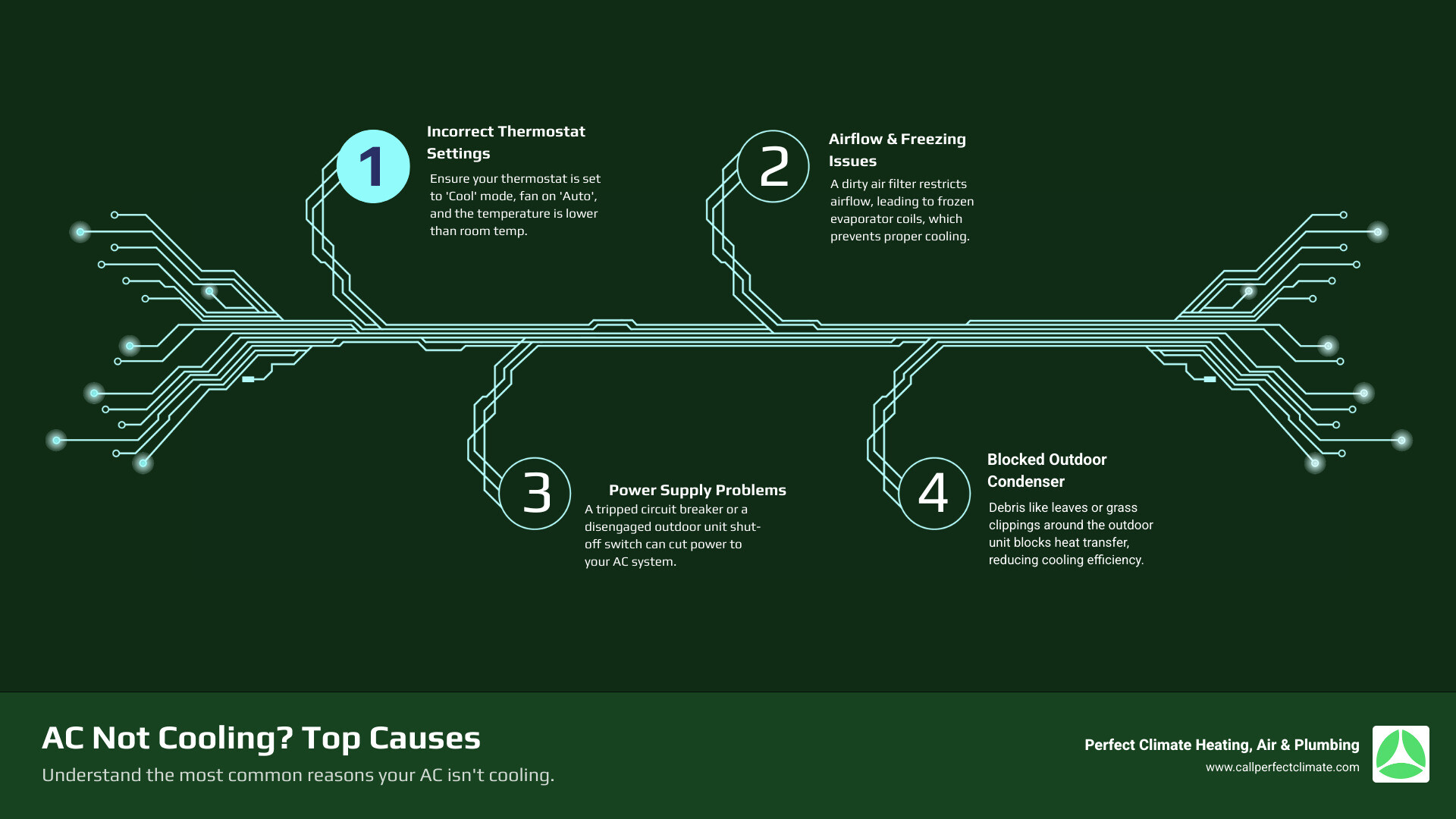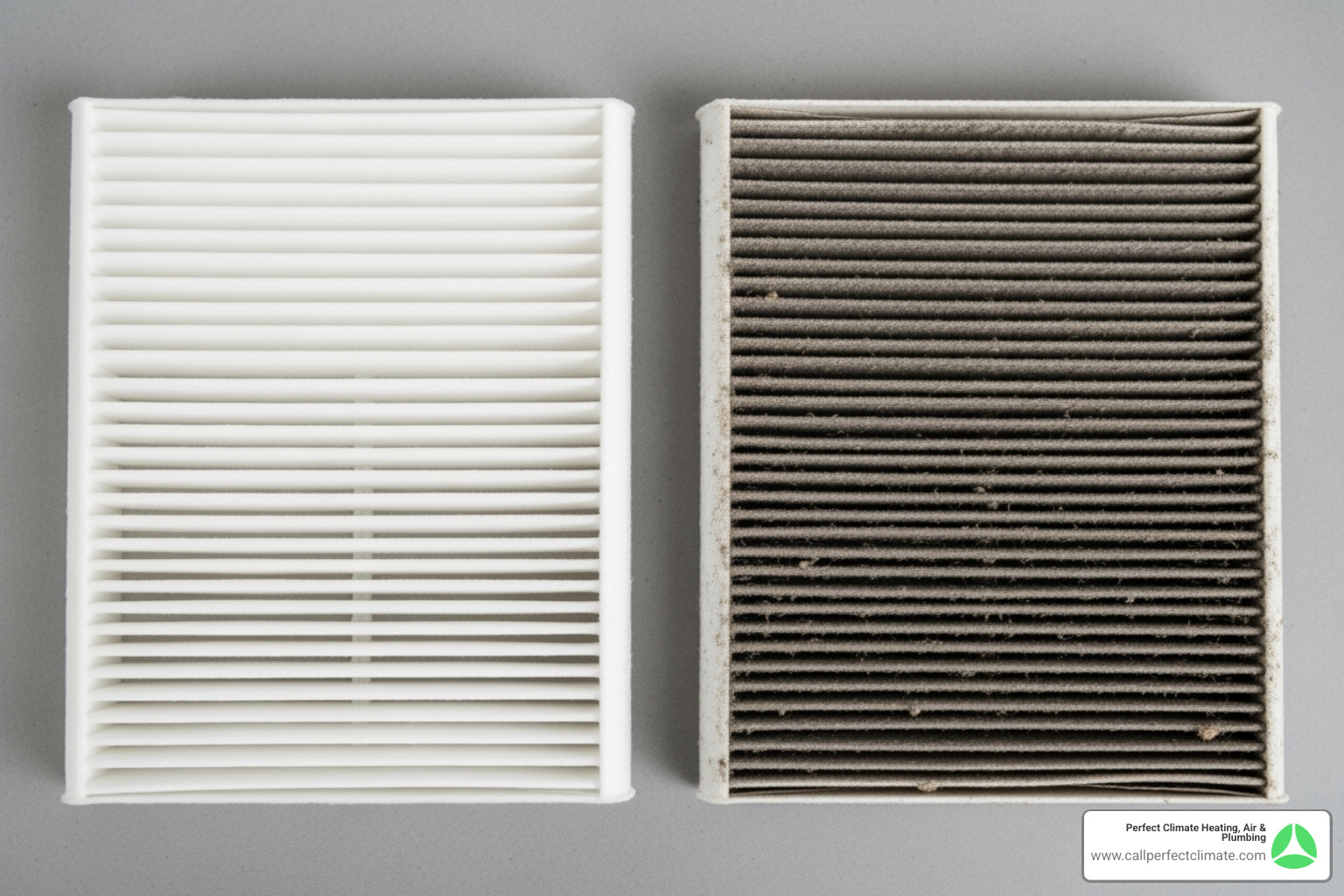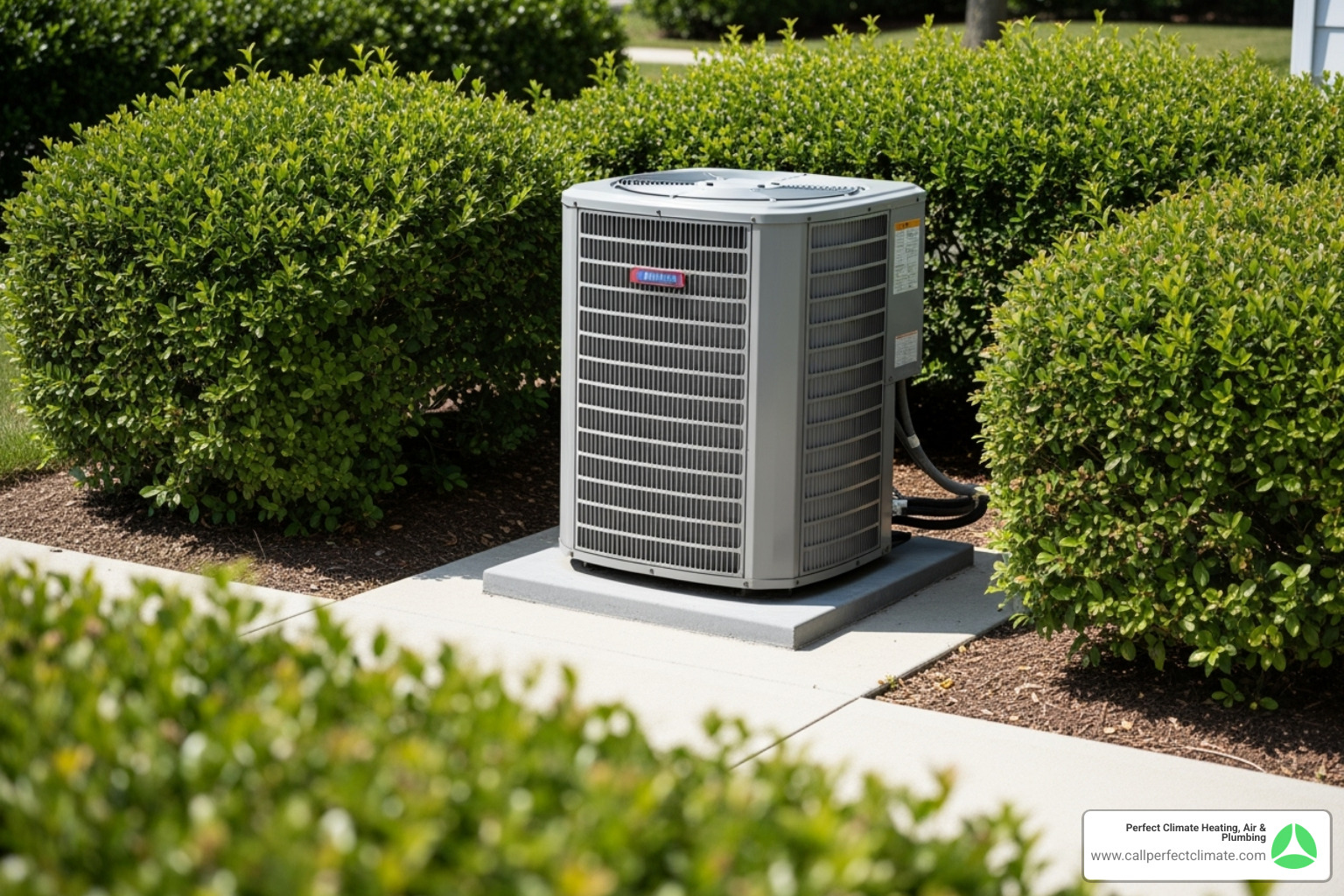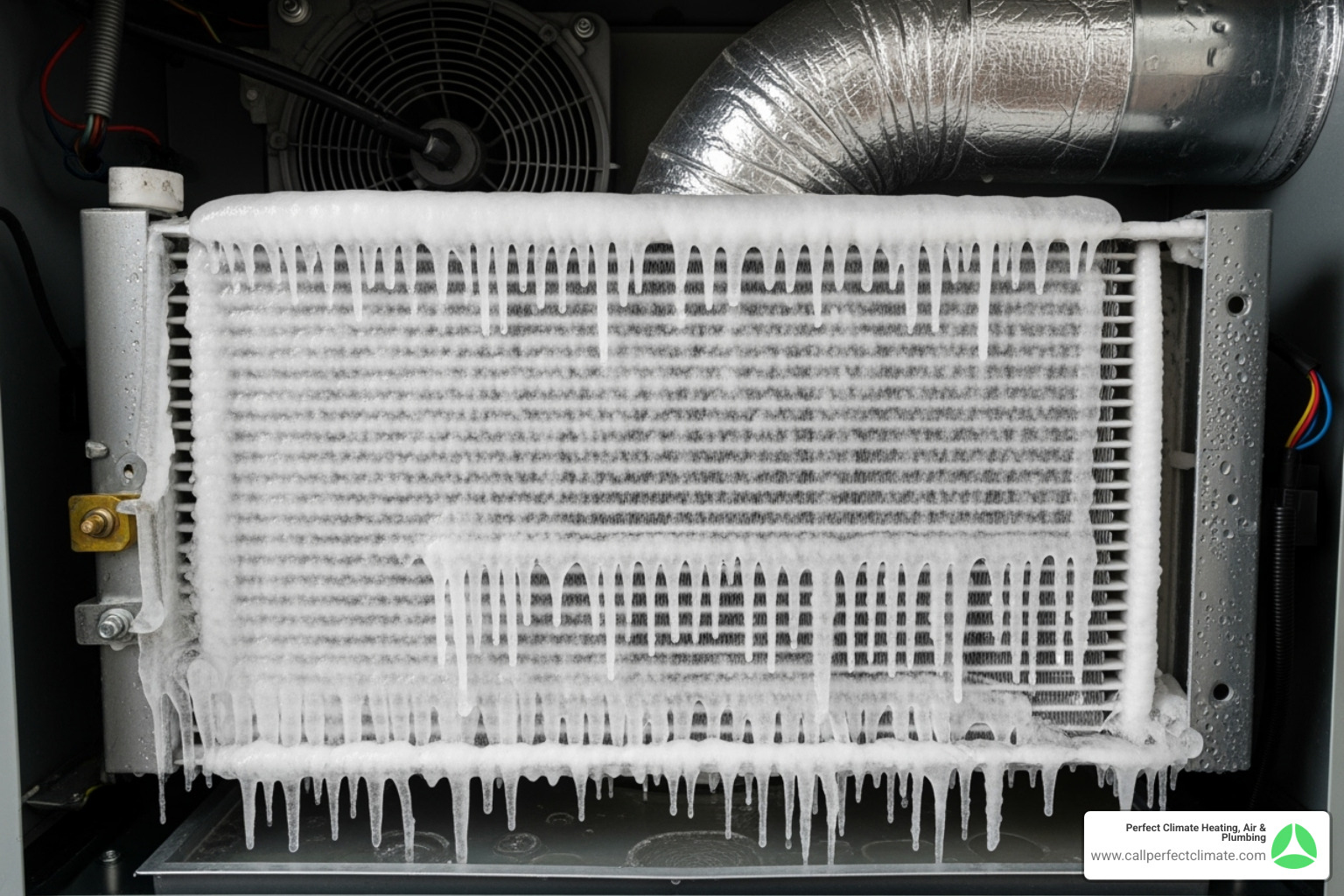When Your Home Becomes an Oven: Understanding AC Cooling Failures
It’s frustrating when your air conditioner runs, but your home stays warm. If your AC system is not cooling, you’re not alone in this sweaty predicament.
Quick diagnosis for AC not cooling:
- Check thermostat settings – Ensure it’s set to “Cool” and fan is on “Auto”
- Replace dirty air filter – Clogged filters block airflow and can freeze coils
- Reset tripped breaker – Power issues often stop outdoor units from running
- Clear outdoor unit – Remove debris blocking condenser coils
- Look for ice buildup – Frozen coils indicate airflow or refrigerant problems
- Listen for strange sounds – Hissing or grinding noises signal major issues
Your AC works by removing heat from your indoor air and transferring it outside. When this process fails, it just circulates warm air. Most cooling problems fall into two categories: simple fixes you can handle yourself or complex issues requiring professional help. The good news is that about 40% of “broken” ACs just need basic maintenance, like a clean filter or correct thermostat settings.
The bad news? Ignoring these problems can lead to major repairs. A dirty filter can freeze the evaporator coil, low refrigerant can damage the compressor, and electrical issues pose safety risks.
Start Here: Simple DIY Checks Before You Call for Help
Before calling for help, a few simple checks can often solve why your AC system is not cooling. Many issues are minor and don’t require a technician. Let’s walk through the most common culprits, starting with the easiest fixes. For a deeper dive, check out our guide on Common AC Repair Issues.
Troubleshooting an AC system not cooling due to thermostat issues
Your thermostat controls your entire cooling system, so it’s the first place to check if your AC system is not cooling.
- Check the setting: Ensure it’s set to “Cool,” not “Heat” or “Fan.”
- Set the fan to “Auto”: The “On” setting will run the fan continuously, even when the AC isn’t cooling, circulating warm air.
- Lower the temperature: The set temperature must be below the current room temperature for the AC to turn on.
- Check the batteries: A blank or dim screen often means the batteries need replacing.
If these steps don’t help, consider an upgrade. Upgrading to a smart thermostat can cut energy waste and improve comfort.
How a Dirty Air Filter Causes Cooling Problems
A clogged air filter is a common culprit when your AC isn’t cooling effectively. It restricts airflow, forcing your system to work harder and increasing energy bills. This lack of airflow can cause the evaporator coils to freeze into a block of ice, stopping the cooling process entirely. A dirty filter also strains the fan motor, potentially leading to more significant damage.
Check your filter monthly and replace it every one to three months, or more often if you have pets or allergies. This simple task can prevent major problems. For more warning signs, see our guide on 5 Warning Signs You May Need HVAC Repair.
Check Your Breakers and Power Supply
If your AC system has no power, check your circuit breaker panel. Central AC systems typically have two breakers: one for the indoor unit and one for the outdoor condenser. If a breaker has tripped (it will be in the middle position), flip it completely off and then back on.
If the breaker trips again immediately, do not reset it. This indicates a serious electrical problem that requires a professional. Also, check the outdoor shut-off switch, usually in a box near the condenser, and ensure it’s in the “ON” position. Power surges can also cause electrical issues. For more information, see our Pre-Installation AC Electrical Tips.
Clear Your Outdoor Condenser Unit
Your outdoor condenser unit releases heat from your home. If it’s blocked, your AC system won’t cool effectively. Debris like leaves, grass clippings, and dirt can cover the unit, trapping heat and forcing your system to work harder. This increases energy use and strains the compressor, the most expensive component.
Ensure there’s at least two feet of clear space around the unit. Trim back plants and remove any debris. You can also gently rinse the coils with a garden hose (turn the power off first), being careful not to bend the metal fins. A clean condenser is essential for an efficient AC.
Why Your AC System is Not Cooling: Deeper Diagnostic Steps
If the simple fixes don’t work, the problem might be more complex. Issues like frozen coils, refrigerant leaks, or faulty ductwork often require a professional. Understanding these problems can help you know when to call for service. For a comprehensive overview of warning signs that indicate professional help is needed, check out our guide on Signs You Need AC Repair.
The Telltale Signs of a Frozen Evaporator Coil
A frozen evaporator coil stops your AC from cooling, even if it’s running. This is often caused by restricted airflow (like a dirty filter) or low refrigerant. Signs include warm air blowing from your vents, visible ice on the indoor unit or refrigerant lines, and puddles of water from melting ice. You might also hear hissing or gurgling sounds.
What to do: Turn off the AC system completely, but leave the fan running (set the thermostat to “Fan Only”) to help the ice melt. This can take several hours. Do not try to chip the ice off, as this can cause damage. Once thawed, check your air filter. If it freezes again, you likely have a refrigerant leak or another issue that requires a professional. We have detailed guidance on Solving Summer AC Freezing Issues that dives deeper into prevention strategies.
What to do when your AC system is not cooling because of a refrigerant leak
Refrigerant is the substance that cools the air in your AC system. It circulates in a closed loop and doesn’t get used up. If it’s low, you have a leak. This is a common reason for an AC system not cooling.
Signs of a leak include:
- Ineffective cooling: The AC runs but doesn’t cool the house.
- Hissing or bubbling sounds near the AC units.
- Ice on refrigerant lines or the evaporator coil.
- Higher energy bills from the system working harder.
Refrigerant is a hazardous material and should only be handled by a certified technician. Freon leaks can lead to refrigerant poisoning if inhaled in high concentrations. A professional will find and repair the leak before recharging the system. Simply adding more refrigerant is not a long-term solution. Learn more about the proper approach to Fixing AC Refrigerant Leaks.
How Leaky Air Ducts Waste Cool Air
Leaky ductwork can be a hidden reason why your AC system is not cooling your home effectively. If your ducts have cracks or loose connections, the cool air escapes into your attic or walls instead of reaching your rooms.
Key signs include:
- Uneven cooling with hot and cold spots throughout the house.
- High utility bills as your system runs longer to compensate for the lost air. According to Energy Star, duct leaks can be responsible for about 20–30% of your home’s cool air loss.
- Poor indoor air quality from dust and allergens being pulled into the ducts.
Professional duct sealing is the best solution, as it involves finding and sealing all leaks with the proper materials. If your system is also short cycling, leaky ducts could be a contributing factor. Our team can help with Diagnosing AC Short Cycling Problems to get your system running smoothly again.
The Pro’s Playbook: When to Call for Service
After trying the DIY checks and understanding the deeper diagnostic steps, you might realize that your AC system not cooling problem is beyond a quick fix. This is when it’s time to call in the professionals. Attempting complex repairs yourself can be dangerous and often leads to more costly damage. We’re here to provide reliable HVAC Repair Services Benefits to ensure your comfort and safety.
Is Your AC Unit Too Old?
Most AC units have a lifespan of 10 to 15 years. If your AC system not cooling is an older model, its age could be the primary culprit. As systems age, their components wear down, leading to decreased efficiency, more frequent breakdowns, and higher energy bills. If your unit is over 10 years old and experiencing frequent issues, it’s often more cost-effective to replace it rather than continue with repairs. Newer models are significantly more energy-efficient, which can lead to substantial savings on your utility bills.
Furthermore, if your older system uses R-22 refrigerant (often called Freon), it’s being phased out, making it increasingly expensive and difficult to obtain. This makes repairs for R-22 leaks particularly costly. Our team can help you assess if it’s time for an upgrade. Learn more about the Time for AC Replacement Signs.
Diagnosing a Faulty Compressor
The compressor is the heart of your AC system, circulating refrigerant to cool your home. If the compressor fails, your AC system not cooling problem becomes a major one.
Signs of a faulty compressor can include:
- Loud grinding or buzzing noises: Unusual sounds from your outdoor unit can indicate a failing compressor.
- Tripping breaker: A struggling compressor might draw too much power, causing its circuit breaker to trip repeatedly.
- No cooling whatsoever: If the compressor isn’t working, the refrigerant won’t circulate, and your system won’t produce any cool air.
- Outdoor unit not running: If the indoor unit blows air but the outdoor unit isn’t running, it’s a strong indicator of a compressor issue.
Compressor problems are complex and should always be diagnosed and repaired by a professional. Replacing a compressor is a significant repair, and often, if the compressor fails on an older unit, it makes more sense to replace the entire system. Our technicians are experts at Troubleshoot AC Compressor Issues.
Comparing AC Repairs vs. Full System Replacement
When your AC system not cooling requires professional attention, you’ll often face a decision: repair or replace? This depends on several factors, including the age of your unit, the severity of the problem, and the cost of the repair. Here’s a quick guide to help you decide.
| Factor | Repair If… | Replace If… |
|---|---|---|
| Age of System | It’s under 10 years old. | It’s over 10-15 years old. |
| Cost of Repair | The repair is less than 50% of the cost of a new system. | The repair is very expensive, nearing the cost of a new unit. |
| Frequency of Repairs | This is an infrequent issue. | You’re constantly calling for service. |
| Efficiency & Bills | Your energy bills are still reasonable. | Your energy bills have been steadily increasing. |
| Refrigerant Type | Your system uses modern R-410A refrigerant. | Your system uses older, phased-out R-22 refrigerant. |
For long-term savings and peace of mind, especially with older units or major component failures, a full system replacement can be a wise investment. New, energy-efficient models can significantly reduce your utility bills and come with warranties, saving you from future repair headaches. Our team specializes in Energy Efficient AC Solutions and can help you weigh the options.
Frequently Asked Questions about AC Cooling Issues
We often hear similar questions from homeowners facing an AC system not cooling. It’s completely natural to have concerns when your home comfort is on the line! Here are some of the most common questions we get, along with our expert advice to help you out.
Should I turn off my AC if it’s not cooling?
Yes, absolutely. If your AC system is not cooling, turn it off immediately, especially if it’s blowing warm air, making strange noises, or has ice on it. Continuing to run a malfunctioning unit can cause more severe and costly damage, such as harming the compressor. If you suspect a refrigerant leak (hissing sounds), turning it off is critical for safety and to prevent further damage. Powering down is the first step when you’re getting Hot Air: Why Is My AC Blowing Hot Air?.
Why is only one room not cooling while the rest of the house is fine?
This common problem usually points to an airflow issue, not a system failure. The main AC unit is likely working, but the cool air isn’t reaching that specific room. Check for these common culprits:
- Blocked vent: Ensure the room’s supply vent isn’t closed or obstructed by furniture.
- Leaky ductwork: A crack or loose connection in the ductwork leading to that room can let cool air escape.
- Poor insulation: The room may have inadequate insulation, allowing heat to enter easily.
- Closed interior door: Keeping doors closed can restrict air circulation.
While you can check for blocked vents and open doors, issues like leaky ducts or poor insulation often require a professional.
How often should I have my AC professionally serviced?
We recommend professional AC maintenance at least once a year, ideally in the spring before summer heat arrives. Annual tune-ups are a proactive investment that helps:
- Prevent breakdowns: Technicians can spot and fix minor issues before they become major problems.
- Maintain efficiency: A clean, well-adjusted system runs more efficiently, lowering your energy bills.
- Extend lifespan: A well-maintained unit lasts longer, delaying a costly replacement.
- Validate warranty: Many manufacturers require annual maintenance to keep your warranty valid.
- Improve air quality: Technicians clean components, removing dust and potential mold.
Don’t wait for an emergency. Be proactive and Schedule a Pre-Season AC Tune-Up with us.
Get Your Cool Back with Professional Help
Phew! You’ve made it this far, and we hope this guide has given you some great insights into why your AC system not cooling might be acting up. It’s truly empowering to know that simple steps like checking your thermostat, replacing a dirty air filter, or giving your outdoor unit a good clear-out can often get your cool air flowing again. You’ve done your part, and that’s fantastic!
However, sometimes the mystery of the warm house runs a little deeper. If you’re facing persistent issues like a frozen evaporator coil that keeps coming back, suspect a refrigerant leak, hear strange sounds pointing to a faulty compressor, or are dealing with tricky electrical problems, that’s your cue to call in the cavalry. These aren’t just minor hiccups; they often involve specialized tools, a deep understanding of complex systems, and sometimes, even hazardous materials. Trying to tackle these bigger problems yourself can be risky, and frankly, often leads to more costly repairs down the line. That’s where we come in!
At Perfect Climate Heating, Air & Plumbing, we’re not just technicians; we’re your neighbors! We’re proud to be your go-to HVAC and plumbing experts right here in Haubstadt, IN, and we happily serve our friends in nearby Evansville, Princeton, and Newburgh too. We know how hot those Indiana summers can get, and we’re dedicated to making sure your home stays a cool, comfortable oasis.
So, if your AC system not cooling is still giving you the cold shoulder (or, rather, the warm shoulder!), don’t sweat it any longer. Let our certified pros take a look. We’ll diagnose the issue accurately, explain everything in plain language, and get you back to enjoying that perfect indoor climate.
Ready to reclaim your cool? Request professional AC repair in Princeton, IN today!





